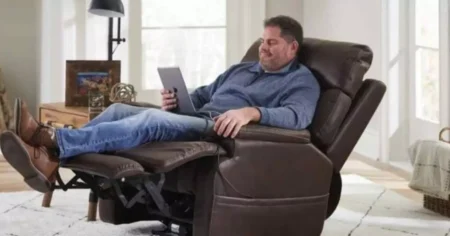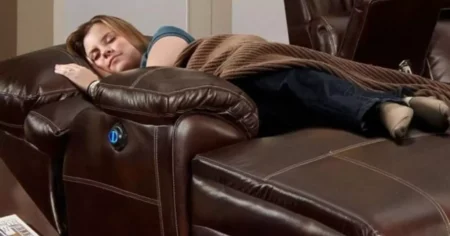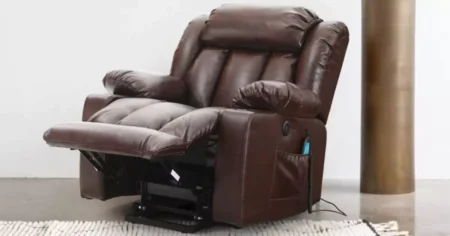You may sleep better in a recliner than in a bed due to several reasons. The reclined position can alleviate pressure on your spine and reduce snoring.
It also promotes better blood circulation and can ease conditions like acid reflux.
Some people find the snugness of a recliner comforting, which aids in relaxation. However, it’s important to note that prolonged sleeping in a recliner may not be ideal for everyone, as it can lead to discomfort or muscle strain over time.
In this article, we will delve more into why you sleep better in a recliner than in a bed.
7 Reasons for Sleeping in a Recliner
1. Improved Circulation
One of the key advantages of sleeping in a recliner is the improved circulation it offers. When you recline, your legs are elevated, which facilitates blood flow throughout your body.
This position can help alleviate swelling and reduce the risk of conditions such as deep vein thrombosis (DVT) and varicose veins.
2. Reduced Back Pain
For individuals struggling with back pain, a recliner can provide significant relief.
By adjusting the recliner to a suitable angle, you can distribute your body weight evenly and reduce pressure on your spine.
This can promote better spinal alignment, allowing you to wake up feeling more refreshed.
3. Relief from Allergies and Asthma
Sleeping in an upright position can be beneficial for those with allergies and asthma.
By keeping your head elevated, a recliner helps prevent congestion and reduces the likelihood of post-nasal drip.
This can lead to more restful sleep and minimize nighttime coughing or wheezing.
4. Improved Sleep Apnea
Sleep apnea, a condition characterized by interrupted breathing during sleep, can be improved by sleeping in a recliner.
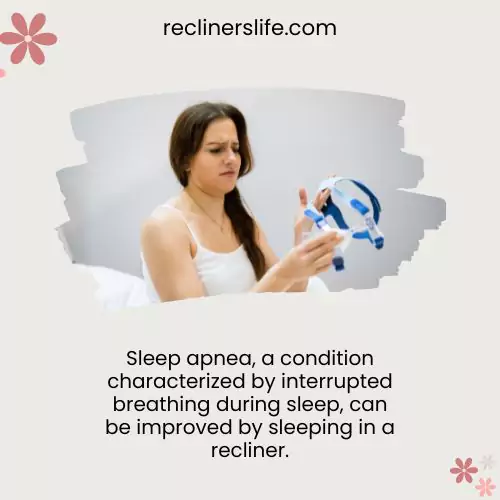
By elevating the upper body, a recliner can help keep the airways open and reduce the frequency of apnea episodes.
5. Prevention of GERD
Gastroesophageal reflux disease (GERD) can cause discomfort and disrupt sleep. Sleeping in a reclined position can help prevent acid reflux by keeping the stomach contents from flowing back into the esophagus.
This elevation can provide relief for individuals suffering from GERD, allowing for a more peaceful night’s sleep.
6. Reduced Stress and Anxiety
The soothing and relaxing nature of recliners can help reduce stress and anxiety levels.
The gentle rocking motion or the ability to recline to a comfortable position can promote a sense of calmness, making it easier to unwind and fall asleep peacefully.
7. Increased Productivity
While not directly related to sleep quality, using a recliner as a workspace or for activities such as reading or studying can have a positive impact on productivity.
The ergonomic design and adjustable features of recliners can provide proper support and help maintain focus, making tasks more manageable.
How to Get a Good Night’s Sleep in a Recliner?
To optimize your recliner sleep experience, follow these tips:
1. Choose a Comfortable Recliner
Select a recliner that suits your body type and personal preferences.
Consider factors such as cushioning, lumbar support, and adjustable features to ensure maximum comfort.
2. Right-Sized Recliner
Ensure that the recliner is the right size for you.
Your feet should comfortably reach the footrest, and there should be ample space to adjust your body position without feeling cramped.
3. Adjust the Recliner
Experiment with different reclining angles to find the position that works best for you.
Some individuals find a slightly upright position more comfortable, while others prefer a deeper recline.
4. Use Pillows for Support
Supplement the recliner’s built-in support with additional pillows.
Place a pillow behind your neck and another for lumbar support to maintain proper spinal alignment.
5. Create a Relaxing Environment
Transform your sleep space into a tranquil oasis.
Dim the lights, use soothing colors, and play soft, calming music to create an environment conducive to relaxation.
6. Avoid Electronics Before Bed
The blue light emitted by electronic devices can interfere with your sleep.
Minimize exposure to screens at least an hour before bed to allow your mind to unwind.
7. Stick to a Sleep Schedule
Establish a consistent sleep schedule, even when using a recliner.
Going to bed and waking up at the same time each day helps regulate your body’s internal clock and promotes better sleep quality.
8. Get Regular Exercise
Engaging in regular physical activity can improve sleep quality.
Incorporate exercise into your routine, but try to complete it at least a few hours before bedtime to allow your body time to wind down.
9. Avoid Caffeine and Alcohol
Limit your intake of caffeine and alcohol, especially in the evening.
These substances can interfere with your sleep patterns and hinder your ability to achieve deep, restorative sleep.
How to Choose the Right Recliner for Sleep?
When selecting a recliner for sleep, keep the following factors in mind:
Consider Your Needs
Identify your specific requirements and preferences. Do you need additional lumbar support? Are you looking for a recliner with massage features?
Understanding your needs will help narrow down your options.
Choose the Right Size
Ensure that the recliner fits comfortably within your sleep space and accommodates your body size.
Consider the dimensions and weight capacity to find the right size for you.
Check the Comfort
Test the recliner in person, if possible, to assess its comfort level. Sit in various positions and adjust the features to determine if it meets your expectations.
Look for Durability
Invest in a recliner made from high-quality materials that can withstand regular use. Look for reputable brands known for their durability and craftsmanship.
Consider Extra Features
Decide which additional features are important to you.
Some recliners offer heat therapy, massage functions, or USB charging ports. Evaluate whether these features align with your sleep preferences.
Safety Concerns of Sleeping in a Recliner
While sleeping in a recliner offers numerous benefits, it’s essential to be aware of potential safety concerns:
1. Risk of Falling Out
To minimize the risk of falling out of a recliner during sleep, ensure that it is stable and properly positioned.
Follow the manufacturer’s instructions for use and avoid recliners with broken or worn-out mechanisms.
2. Risk of Suffocation
Avoid placing pillows or other soft bedding materials in a way that obstructs your breathing.
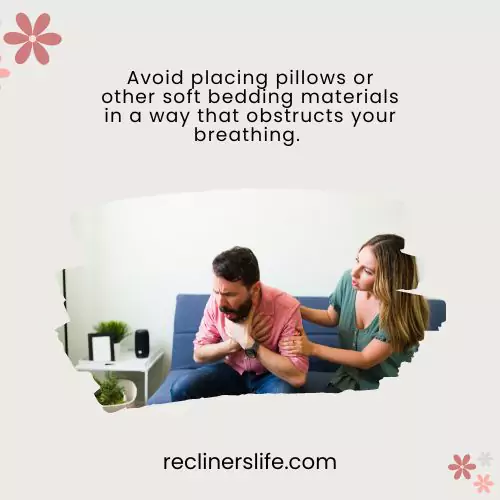
Ensure proper airflow and keep pillows positioned to support your head and neck without compromising your airways.
3. Risk of Fire
Keep flammable objects away from the recliner, especially if it has heating features.
Follow safety guidelines and avoid using electric blankets or heating pads simultaneously with a recliner’s heating function.
Conclusion
In conclusion, many individuals experience better sleep when reclining in a recliner compared to sleeping on a traditional bed.
The reclined position provides benefits such as reduced pressure on certain body parts, improved breathing, and enhanced circulation. These factors contribute to a more comfortable and restful sleep, ultimately leading to a refreshed and rejuvenated feeling upon waking up.
So, if you struggle with sleep quality, consider trying out a recliner to potentially enhance your sleep experience and overall well-being.
Frequently Asked Questions
Is it OK to sleep in a recliner every night?
While sleeping in a recliner occasionally can provide comfort and certain benefits, it is generally not recommended to make it a regular habit. Recliners are designed for relaxation, not as a long-term solution for sleep.
Is it better to sleep in a recliner or adjustable bed?
If you are asking about occasional sleep, then a recliner is the best option. But if you are talking about regular sleep, then I would recommend sleeping in a bed.
Why do older people sleep in recliners?
Older sleep in recliners because of these reasons: Pain Relief, Ease of Getting Up, Comfort And Relaxation, Limited Mobility


